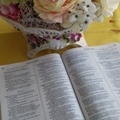[This is one in a series of devotional reflections prepared for Horley Baptist Church during September 2023]
What comes to mind when you hear mention of Waterloo or Trafalgar? Are they just London landmarks? How about Balaclava or Stanley – an article of clothing or a range of tools? For a Briton who knows his history these names represent significant military engagements in past centuries but for most of us their significance fades as the years pass.
Are school pupils still taught about Hastings or Runnymede? The historical relevance of these places is more important than their physical location. Similarly, if we talk about directives from Brussels or hear of a rebellion at Westminster we know that these place names are figurative, surrogates for the administrative functions that take place in those places.
In last week’s reflection based on Psalm 95 we saw two place names, Meribah and Massah.[1] Throughout the Bible there are other references to places from Israel’s history, places that have little significance to us reading the Bible in a different time and culture. However, for those who were hearing these names nearer to the time or for a Jew who knows his history, they would have a great impact and add emphasis to the dialogue.
In John’s account of the conversation between Jesus and the Samaritan woman at Sychar we see an apparently casual reference that serves, to us, to simply locate the event.
So he came to a town in Samaria called Sychar, near the plot of ground Jacob had given to his son Joseph. John 4 v5 [NIVUK]
However, historically-aware readers would have recognised that this statement has more significance:
And Joseph’s bones, which the Israelites had brought up from Egypt, were buried at Shechem in the tract of land that Jacob bought for a hundred pieces of silver from the sons of Hamor, the father of Shechem. This became the inheritance of Joseph’s descendants. Joshua 24 v32 [NIVUK]
Both Jews and Samaritans claimed lineage from Jacob. Despite their mutual dislike, this location had a particular importance in their national heritage. For them, it was a place to be revered. For us, this additional information puts the subsequent conversation about the different ways to worship God into perspective.
Are we tempted skip over place names in the Bible? Do we dismiss them as simply giving some geographical interest to the narrative? By ignoring the historical significance of these places we lose much of the richness of God’s message to us. So next time you come across a Bible placename, remember that asking ‘what’ might be more important than asking ‘where’.
O God of Jacob, by whose hand your people still are fed,
Who through this weary pilgrimage a wav’ring Israel led:Through each perplexing path of life our wand’ring footsteps guide;
Give us this day our daily bread, and shelter fit provide.Oh, grant us your protecting care till all our wand’rings cease,
That to those mansions kept for us we all may come in peace.
– Philip Doddridge 1702-1751
Resources:
[1] Exodus 17 v7
Bible quotations: Unless otherwise specified, quotations are taken from the resources of Bible Gateway or Bible Hub, in accordance with the licencing conditions outlined on our Site Policies page.
Bible dates:
Where appropriate, the dates given for Biblical events are based on the Bible Timeline resource
and are subject to the constraints defined on the corresponding webpage.
 Horley Baptist Church online
Horley Baptist Church onlineHBC main site
Confidential prayer link
Link to Recent Reflections
Link to Index of Bible Passages
Last week’s reflection: Chapter and Verse
Contributed by Steve Humphreys; © Steve Humphreys

Penuel. Who did Jacob wrestle with?